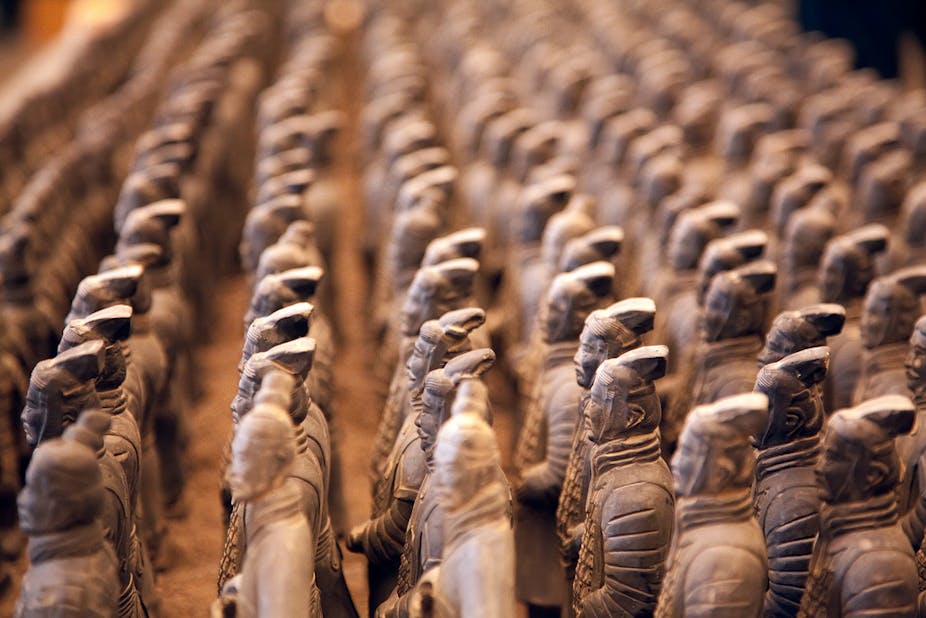Whether you fear or welcome a challenge to the world’s existing power structure, the main focus of attention is on when China will begin to translate its increasing influence into genuine global leadership. And after a period when China has widely been seen as wanting to have power without leadership or responsibility, there are some signs that things are beginning to change.
To be sure, we need to retain a sense of proportion. When China does something new it can often garner much greater attention than the ongoing continued activities of others. For example, while China has been identified as being on the “frontline” in the battle against Ebola, its actual contribution has been relatively modest compared to that of what the Guardian called the “usual suspects” of development assistance.
Furthermore, much of the new(ish) proactive Chinese international strategy has Chinese national and commercial interests very much front and centre; the promotion of a new maritime silk road seems to be a rather apt example here. But with these caveats in mind, something interesting seems to be happening in terms of China’s growing involvement in Afghanistan.
Taking Kabul by the horns
In October 2014, China for the first time hosted a meeting of the Istanbul Ministerial Process established to promote peace and co-operation between Afghanistan and its neighbours. In the words of a foreign ministry spokeswoman, the simple act of holding the event was an opportunity for China to promote its leadership credentials and allowed China to:
Showcase the world’s support to the peaceful reconstruction in Afghanistan, and build consensus of regional countries on strengthening co-operation on Afghanistan and jointly safeguarding security and stability in Afghanistan and the region.

China’s leaders also used the opportunity to increase its financial aid to Kabul, pledging extra funding, training, and technical assistance. So far so normal – China has established a track record in using high-profile meetings such as APEC, the Forum on Africa-China Co-operation and so on to make announcements of new funding and aid initiatives.
Hey Mr Taliban..
But then something different happened as China began to provide some sort of mediating role and directly involved itself in Afghani politics by holding talks with both the Afghan government and the Taliban. As the US prepares to withdraw from Afghanistan, China seems increasingly willing to step in to fill the void and – for some analysts – to increase its international standing as a putative global leader in the process.
Perhaps it might even have more success than the other great powers that have tried, and failed, to pacify Afghanistan over the years. At the very least, it does not carry the same historical baggage as others in Afghanistan (or indeed, in the Middle East in general).
Of course, there are very good reasons for China to act. In the past, China claims that Afghanistan and al-Qaeda provided a safe haven for Muslim military separatists committed to “splitting” China and creating an independent Islamic East Turkestan state.
This might explain why China was prepared to accept US-led military action in Afghanistan in the first place, notwithstanding China’s usual commitment to defending state sovereignty. Contributing to peace and stability in Afghanistan, then, is not just an act of altruistic leadership, but one that has a clear national interest dimension for China as well.

That said, other global leaders have often acted out of self interest as well; the global financial order built at Bretton Woods at the end of World War II was not exactly free from the influence of US economic considerations.
So how should we judge China’s emerging role as a provider of some form of global public goods?
Overtaking manoeuvre
Chinese strategists refer to the current era as one of strategic opportunity. Not least because of the consequences of the global financial crisis, a global power change has been accelerated, that has seen China rise while existing powers (most notably in Europe) decline. This has created a great opportunity for China to push to change the global order to one that is more reflective of Chinese power and Chinese interests.
But this opportunity is constrained by the residual power of the US which will remain, in Chinese eyes, the predominant global power for some time to come. Indeed, vice premier, Wang Yang, said as much in Chicago in December when he reaffirmed China’s commitment to a US-led rule based world order which China has “neither the ability nor the intent” to overturn.
The challenge for China is not (yet) how to replace the US, but how to act as its No.2. In the case of Afghanistan, the No.1 seems relatively comfortable with a greater Chinese role. But it’s not always the case that the No.1 seems amenable to accommodating China’s further rise. Where it isn’t, China has begun to take action to build its own alternatives.
So if the US won’t ratify changes to voting power at the IMF that would give China a greater say – and the power structure at the ADB continues to favour others – then China is prepared to launch its own organ of financial governance in the form of the Asian Infrastructure Investment Bank. Here we see China competing for some form of leadership by replicating existing ways of doing things, rather than trying to fundamentally challenge the very nature or essence of global governance and the global order.
China as No.2, then, seems increasingly prepared to take on some degree of leadership – as long as that leadership simultaneously serves other domestic ends. China’s leaders have also become skilled at using major international events to put over a preferred national image of what China is and what it stands for to an international audience.
Given the renewed focus on environmental issues in light of China’s airpocalypse, the Paris climate change conference at the end of the year might be very interesting indeed for students of China’s changing global role.

